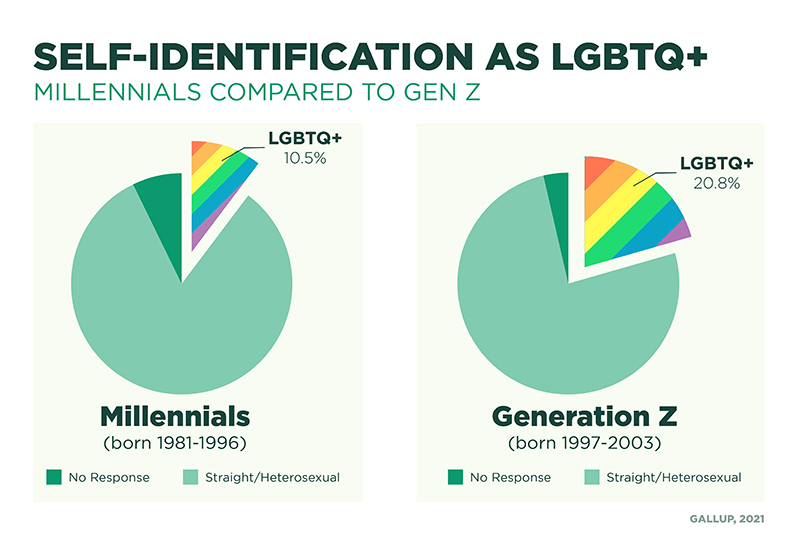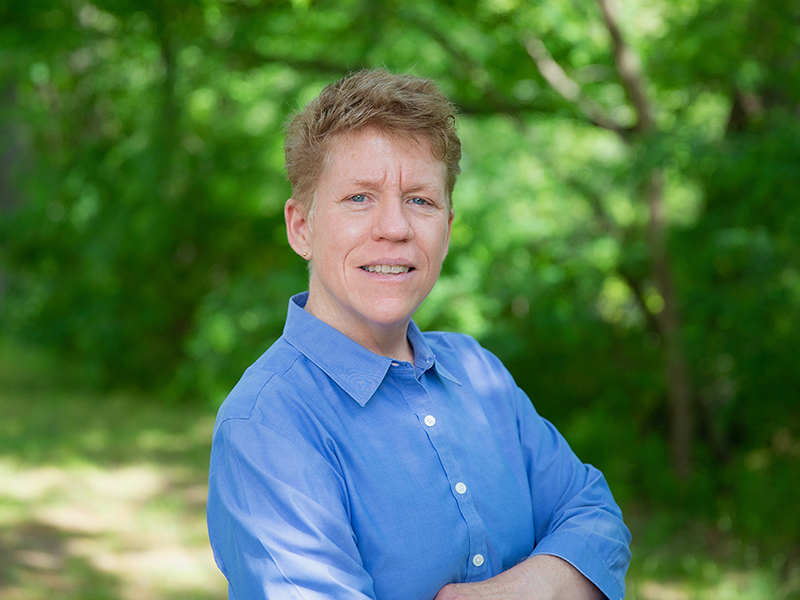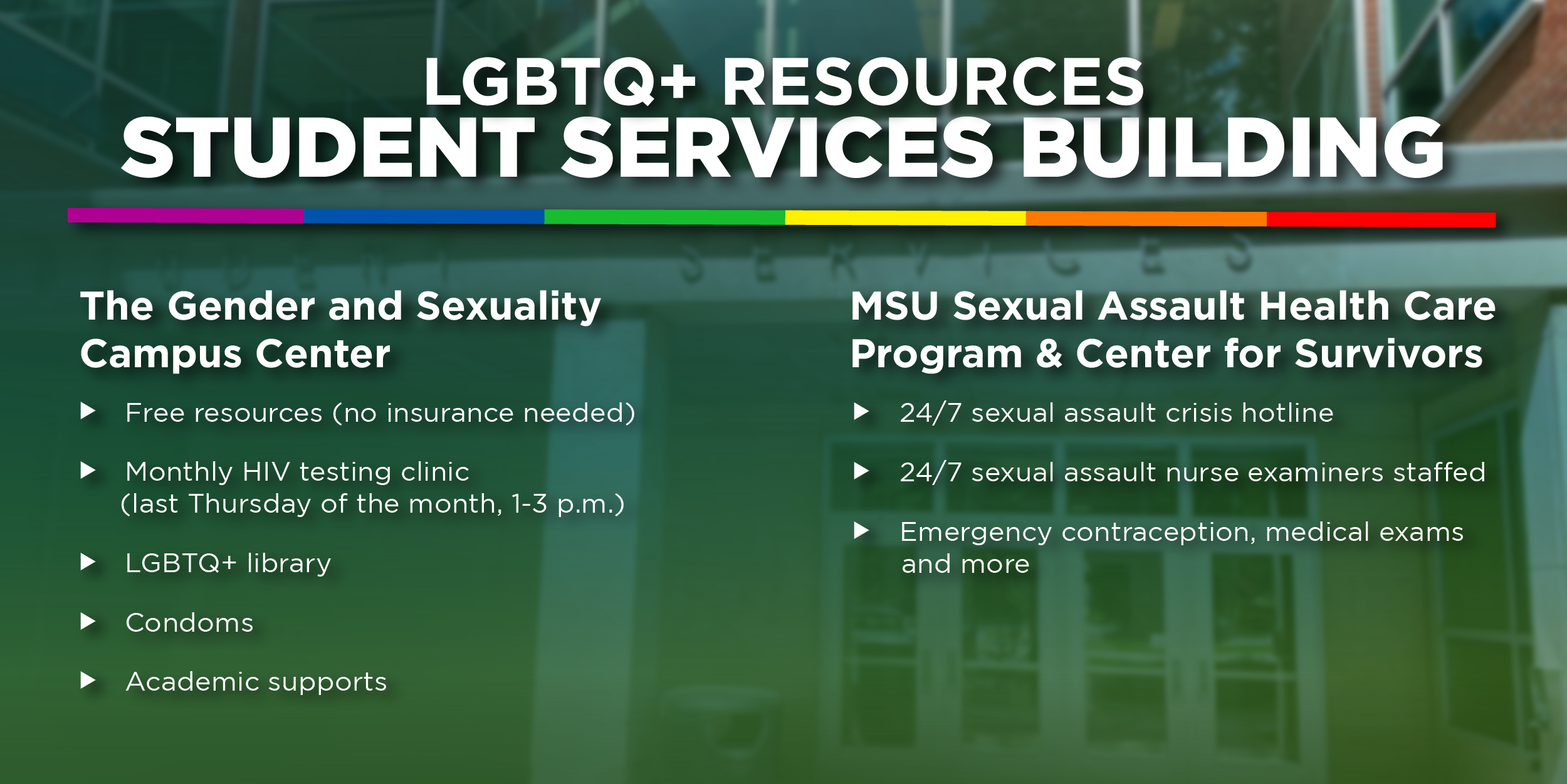Supporting LGBTQIA+ students, MSU resources Spartans ought to know
June 8, 2022 - Beth Brauer and Jesús Hernandez
When it comes to students who identify across the gender and sexuality spectrum, U.S. college campuses possess a greater representation of diverse identities than the national average.
In a recent Gallup poll, 7.1% of U.S. adults identify as members of the LGBTQ+ community, compared to approximately 17% of American college students as reported by the Postsecondary National Policy Institute.
Natalie Harmon says she chose Michigan State University’s James Madison College because she liked the idea of being part of “a tight-knit community,” while also having opportunities that exist at a larger university. Harmon, a rising junior majoring in comparative cultures and politics, or CCP, explains how the residential college community has fostered her own acceptance of who she is.
“This new community I found myself a part of is full of diverse perspectives and backgrounds, including many LGBTQ+ students. Before I entered JMC, I repressed my sexuality and tried to ignore who I truly am,” Harmon said. “I began to feel comfortable expressing myself when I saw my identity being represented in class topics and discussions…. [M]y time in this residential college has ultimately helped me to better understand myself and the experiences of my LGBTQ+ peers.”

The percentage of Generation Z adults (birth years from 1997-2012) who identify as LGBT has more than doubled compared to Millennials (1981-1996) who identify similarly. As more Gen Z students come of age and pursue higher education, American college students identifying as LGBTQIA+ are expected to increase; the uptick amongst Gen Zers is due to the younger members of the generation reaching adulthood.
Michigan State professor and scholar Kristen Renn is encouraged by the progress colleges and universities have made in providing services, programs and education for and about LGBTQ+ students. “Whether in a resource center or distributed across offices that address student leadership, activities, and health and wellness, these services are critical supports for LGBTQ+ students and their allies on and off campus,” Renn said.
“According to the Consortium of Higher Education LGBT Resource Professionals — the most reliable source — there are just over 250 [resource] centers in the U.S. That’s an expansion in the last five years from about 220.”

Renn is the Mildred B. Erickson Distinguished Chair in the top-ranked Higher, Adult and Lifelong Education program in the College of Education. “The substantial amount of anti-trans and anti-queer legislation aimed at youth across the U.S. is a powerful reminder that school-based and campus-based supports remain essential to student wellbeing,” said Renn, who is also associate dean of Undergraduate Studies for Student Success Research.
Brian Johnson, assistant dean for diversity, equity and inclusion plans to have James Madison’s LGBTQ+ student organization Stonewall Society relaunched in the fall. The students who facilitated the group’s activities prior to the COVID-19 pandemic graduated during the pandemic.
Fortunately, MSU offers a variety of resources and services to support the needs of LGBTQIA+ students and employees.
Explore the Student Services Building
The Student Services Building offers many resources and connections. Located on East Circle Drive, just across from the MSU Broad Art Museum, the Student Services Building is home to The Gender and Sexuality Campus Center, or GSCC, and the Center for Survivors. Throughout the academic year, the GSCC hosts workshops, social events, roommate pairing nights and more. Students can access the LGBTQ+ Library provided through the GSCC. Additionally, the GSCC provides sexual health services, distributes free condoms and hosts confidential monthly HIV testing clinics. The GSCC also provides information about HIV Pre-exposure prophylaxis (PrEP) and assists in scheduling PrEP counseling through MSU’s Olin Health Clinic.
Students who identify as LGBTQIA+ are also eligible for financial support through Michigan State. MSU offers the Pride Scholarship and The Stephen P. Pougnet and Christopher J. Green Endowed Scholarship.
Emergency financial support is available for LGBTQIA+ students through the Unconditional Love Fund, which was established to help support students experiencing extraordinary and unexpected financial hardships associated with their sexual and (or) gender identity.

Discover LGBT-friendly RSOs
Michigan State also has many campus Registered Student Organizations, or RSOs, for LGBT students.
Established in 2018, Arc is a club with a mission to connect LGBTQIA+ across campus by fostering community and building supports through social events and weekly meetings.
MSU TransAction is a group that advocates for transgender rights at the university, holds serious discussions on gender issues and social events designed to support trans, nonbinary and gender nonconforming students.
Delta Lambda Phi is an international fraternity formed by gay men at the University of Minnesota in 1987. MSU’s Chi chapter initially was established in 1991, but it wasn’t until 2009 that formal steps were taken to re-activate the organization. And in 2013, the chapter was rechartered by 13 founding brothers. The fraternity has received national recognition as it continues to provide a safe space for queer and progressive men committed to philanthropy and building friendships.
Reach out to Residence Hall Caucus
For students living on campus, Michigan State offers five Residence Hall Caucuses for LGBTQIA+ students living in one of the campus neighborhoods. These caucuses are meant to be a safe place for LGBTQIA+ students and a place where discussions on LGBT issues can take place. Students are encouraged to voice their concerns or frustrations if they are experiencing bias or other forms of discrimination.
- TRUE is the River Trail LGBT Caucus
- LIGHT (Living in Great Harmony Together) is the Brody Neighborhood LBGT Caucus
- PRIDE (People Respecting Individuality, Diversity and Equality) is the West Circle LGBT Caucus
- PRISM (People Respecting the Individuality of Students at MSU) is the South Neighborhood LGBT Caucus
- SPECTRUM is the East Neighborhood LGBT Caucus
- TRANSCEND is a campus-wide caucus that seeks to build community among transgender, nonbinary and/or gender non-conforming students
Learn about gender and sexuality
At JMC, students can continue their learning of sexuality and gender through courses such as MC 388: Sexual Politics: Historical and Contemporary Perspectives, which is sometimes offered through an education abroad trip to Amsterdam; MC 386: Women and Power in Comparative Perspective; and MC 482: Gender and Violent Conflict.
Susan Stein-Roggenbuck, an associate professor who has taught MC 388, says it is important for students to see themselves represented in the courses they take. “The inclusion of gender identity content is very important. I place those experiences in conversation with the strategies and narratives of other groups to show how marginalized populations influence one another in both cooperation and conflict,” said Stein-Roggenbuck. “How those experiences shape the larger narrative raises important issues about equality, equity and citizenship.”
Recent JMC graduate Taylor Belyea (SRP ’22) decided to enroll in MC 388 because it is an entire class devoted to reproductive health and issues of gender equity, rather than only a unit of study.
“I took away a lot of evidence and examples from the class readings that explain why reproductive health care and access is important [for] everyone, not just cisgender women and heteronormative family units,” Belyea said. “I read the book ‘Radical Relations: Lesbian Mothers, Gay Fathers and Their Children in the United States Since World War II’ in class, as well as ‘Punishing Disease: HIV and the Criminalization of Sickness’ for the class’ honors option. Both books offered an evidence-based understanding of why it is essential to recognize and respect LGBTQ+ folks within a reproductive justice framing.”
In addition to the courses offered through James Madison, several colleges across campus offer course listings that focus on gender and sexuality. Additionally, all MSU students can sign up for a free D2L course called “Quest 1.” The course provides introductory concepts and knowledge to gain a solid foundation on LGBTQIA+ identities.
Learn more about current university initiatives such as gender-inclusive housing, the all-gender restroom design study and the findings from the short-term work group on names and pronouns.

